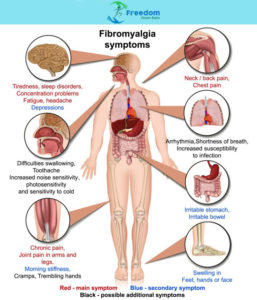Fibromyalgia is a condition that causes chronic (ongoing) problems with generalised pain, tenderness and muscle stiffness throughout the body, alongside an increased response to touch or pressure.
Fibromyalgia is common and affects women more than men – in fact, 80 to 90 per cent of people affected are female. It is most commonly diagnosed in middle age.
 Symptoms of fibromyalgia :
Symptoms of fibromyalgia :
People with fibromyalgia commonly experience aching pain in various regions of the body, including joints and muscles.
Every person with fibromyalgia will have a different set of symptoms but common symptoms include:
- muscle stiffness, often noticed most in the morning;
- increased sensitivity to touch (tenderness), with certain areas being super-sensitive (‘tender points’);
- problems sleeping;
- extreme tiredness;
- problems with memory and concentration (sometimes called ‘fibro-fog’);
- headaches;
- tingling and numbness in the hands and feet;
- sensitivity to temperature, loud noises and bright lights;
- symptoms of irritable bowel syndrome (IBS) or gastro-oesophageal reflux disease (GORD); and
- in women, painful periods.
Symptoms can range from mild to severe, and may be persistent or come and go.
Causes of Fibromyalgia :
There are several factors that are thought to increase the risk of having this condition, or act as trigger factors for fibromyalgia, including:
- having certain conditions, such as rheumatoid arthritis, osteoarthritis, systemic lupus erythematosis (SLE), chronic fatigue syndrome or ankylosing spondylitis;
- ongoing pain from an injury or a repetitive injury;
- a stressful, traumatic event (such as a car accident);
- emotional distress;
- illnesses such as viral infections; and
- a family history of fibromyalgia.

